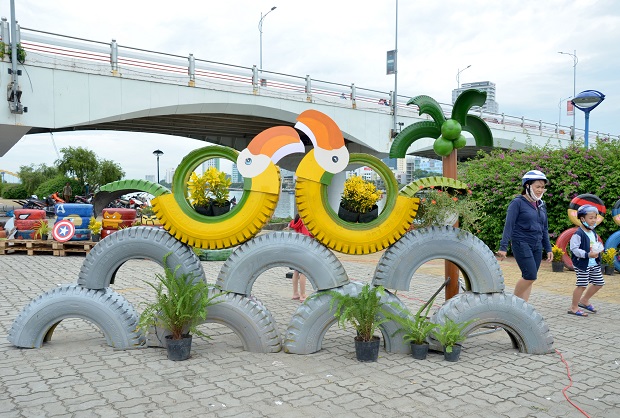A lot of disposable cups are used every day by hundreds of coffee, milk tea, and sweet soup shops across Da Nang despite increasing media attention about the harmful effects of plastic waste on our oceans.
 |
| Numerous painted tyres of different sizes were used to create interesting and eye-catching art works. |
Encouragingly, many young people in Da Nang have been actively involved in protecting environment by reducing the use of plastic products, and recycling plastic waste.
In particular, late July, old tyres became beautiful works in an art display entitled ‘Tropical Colours’, which took place at the Park in the northern side of the Han Swing Bridge on Tran Hung Dao Street. The interesting event draw much attention from visitors and residents.
Local artists brought new life into old tyres through creating many amazing arts works from such products which were collected at scrapyards and car repair garages.
The displayed works featured the Rong (Dragon) Bridge, rabbits, a family of green frogs, and such famous Marvel superheroes as Spidermen, Iron Man, Captain America and Dr Strange.
Hosted by the city’s Events and Festivals Organising Centre, the display aimed to raise public awareness about the environmental protection and recycling of materials after use.
The recycling of plastic waste has been very popular in developed countries worldwide over the past decades.
In Da Nang, some residents have used recycled materials to decorate their coffee shops in order to make them more inviting to customers.
The Madam Thu Coffee and Milk Tea shop is a typical example.
Located at 173 Nguyen Luong Bang in Lien Chieu District, the venue becomes popular with young people thanks to its delicious drinks and impressive interior decoration.
The owner of the venue, Mrs Thu, has created beautiful tables and chairs, and an eye-catching signboard from old tyres. In addition, her shop becomes more attractive thanks to its special decoration with many lovely recycled materials.
Most notably, members of the ‘Green Hero’ group implemented an ‘Anti-plastic straws’ campaign from 8 August to 26 September 2017 to encourage their relatives and friends to replace plastic straws with bamboo ones.
During that period, the group members visited some coffee shops across the city to convince shops’ owners to use bamboo straws instead of plastic ones.
However, most of owners of coffee shop hesitate to use re-useable straws in public places which are not always hygienic or easy to clean.
The group's efforts finally paid off as the Tipi Café at 57 Pham Van Nghi in Thanh Khe District and the Click Coffee at 2 Huynh Thuc Khang in Hai Chau District agreed to use bamboo straws on a trial basis for 1 month.
Currently, some coffee shops in the city are using bamboo straws instead of plastic ones. Included are Goc Nha Tui Minh in alley No 36 on Le Duan, Goom at 144 Nguyen Chi Thanh, and 198X at 73 Ly Tu Trong.
In late 2014, the city saw an increasing number of coffee shops with chewable cups, specially the Milano at 97 Nguyen Chi Thanh Street.
The shop’s cups and dishes are made from French cake-making ingredients. A thin layer of chocolate is plastered inside these cups and dishes for waterproof prevention.
Like Milano, the ‘Giay’ (Papers) Coffee Shop at 310 Hai Phong attracted a great deal of attentions from locals and visitors when replacing plastic coffee cups with jelly ones.
In attempting to reduce environmental pollution, a group of former students from the Da Nang University of Technology and Science has successfully created a mechanical system to turn plastic waste into useful products, instead of throwing away them.
They are Nguyen Thi Thuy Duong, Nguyen Thanh Do, Nguyen Van Dung and Doan Cong Trung.
Their whole system comprises crushing, spinning, and compressing machines. First the crusher grinds the plastic waste into granules, and then the spinning machine turns the granules into plastic fibres of different sizes for use in 3D printers and fine arts decorations, or for other purposes. The compressing machine produces molded products for daily use, including dustbins, flower pots, trays, toys for children, and utensils.
Notably, the strong-willed students won a consolation prize at the 2016 university-level scientific research conference, and their system was highly appreciated for minimising the negative impacts of plastic waste on the environment.